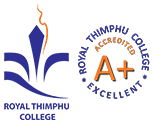BSHS is a 4-year programme in Sports and Health Sciences offered at the Royal Thimphu College in affiliation with the Khesar Gyalpo University of Medical Sciences of Bhutan (KGUMSB). Implemented in the academic year 2022, this is the first undergraduate degree programme with a specialization in sports in the country. The programme not only aims for improving the health and physical well-being of the learners, but also aspires to enhance the role that sports can play in boosting social cohesion, for their educational value, and for economic reasons. Only through a systematic higher education degree in sports, a clear understanding of the value of sports and fitness is gained, which in turn will lead the way toward improving the services in this sector. This degree course will equip students with the necessary skills to address the challenges of delivering quality sports and physical activities and their benefits to individuals, communities, and societies, and will contribute to the overall sporting culture of Bhutan in a professional manner.
Module Structure
|
Yr |
Sem |
Modules |
||||
|
1 |
I |
HDS101 Historical Development of Sports and Physical Education |
SFH101 Structure and Function of the Human Body |
GAT102 Game Sense Approach to Teaching and Coaching |
IFLF103 Foundation Learning in Football |
IPS101 IT and Basic Problem Solving |
|
II |
FAW101 Fitness and Wellness |
MLS101 Motor Learning and Skill Acquisition |
FLV103 Foundation Learning in Volleyball |
EAP101 Intermediate English for Academic Purposes |
GSE101 Analytical Skills |
|
|
2 |
I |
KAB201 Kinesiology and Biomechanics |
BIG201 Bhutanese Indigenous Games |
FLB205 Foundation Learning in Badminton |
EAP102 Upper-Intermediate English for Academic Purposes |
DZG101 Dzongkha Communication |
|
II |
SEP201 Sports and Exercise Physiology |
LED201 Leadership in Sport |
SST201 Sports-Specific Skills Tests |
FLB201 Foundation Learning in Basketball |
Global/ Bhutan Studies Elective (either of the following) Contemporary World Politics |
|
|
3 |
I |
BSM301 Basic Concepts of Sports and Exercise Medicine |
PTS301 Periodization Training for Sports |
SOM301 Sports Operations and Facilities Management |
FLT301 Foundation Learning in Table Tennis |
EDP101 Entrepreneurship |
|
II |
SPS301 Sports Psychology |
NIS301 Foundation Study on National and International Sports Agencies |
SFA301 Sports Safety and First Aid |
REM301 Research Methods |
FLA301 Foundation Learning in Athletics |
|
|
4 |
I |
*FPI401: Field Practical Immersion |
||||
|
II |
RRR401 Risks, Rehabilitation, and Resilience in Sports |
DDS401 Drugs and Doping in Sports |
APE401 Adapted Physical Education and Sports |
FNP401 Foundation of Nutrition in Sports |
FLT101 Financial Literacy |
|
The programme provides a choice of study to young aspiring sports professionals from high schools to remain connected with sports while pursuing their studies. The programme is expected to attract sports professionals as well as sporting enthusiasts who wish to build their careers in sports. The programme of study will provide theoretical knowledge along with practical skills that professional athletes, future managers, coaches, trainers, and instructors of sports and games need in order to scientifically manage their own athletic careers as well as engage in the training of other community members including youths in sports and games. Graduates will be able to demonstrate the reciprocity between health and sports through basic empirical data and necessary scientific knowledge.
In addition, through several general education modules included in the programme of study, graduates with this 4-years undergraduate degree will have imperative life skills such as good communication and analytical skills, the ability to solve problems, and other life skills required to be successful in any relevant career that he/she chooses.
Entry Requirements into the programme
Class XII pass in Science, Arts or Commerce with minimum 50% aggregate marks in 4 best subjects. Admissions will be confirmed on merit, based on the following three criteria, with their weightings as indicated below:
- Academics: 40%
- Sport/Games certificates from recognized Sports agencies such as BOC, BAAF, BFF, etc.: 40%
- Aptitude Test (Written/ physical endurance): 20%
